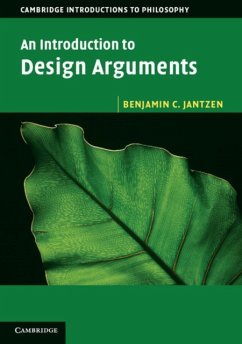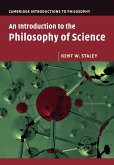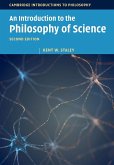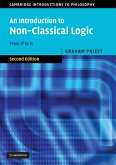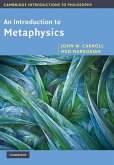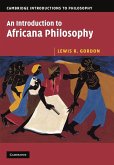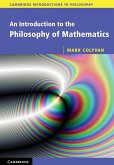Benjamin C. Jantzen (Virginia College of Technology)
An Introduction to Design Arguments
Benjamin C. Jantzen (Virginia College of Technology)
An Introduction to Design Arguments
- Broschiertes Buch
- Merkliste
- Auf die Merkliste
- Bewerten Bewerten
- Teilen
- Produkt teilen
- Produkterinnerung
- Produkterinnerung
A comprehensive survey of the many different forms of design argument for the existence of God.
Andere Kunden interessierten sich auch für
![An Introduction to the Philosophy of Science An Introduction to the Philosophy of Science]() Kent W. Staley (Missouri St Louis University)An Introduction to the Philosophy of Science40,99 €
Kent W. Staley (Missouri St Louis University)An Introduction to the Philosophy of Science40,99 €![An Introduction to the Philosophy of Science An Introduction to the Philosophy of Science]() Kent W. Staley (Missouri Saint Louis University)An Introduction to the Philosophy of Science40,99 €
Kent W. Staley (Missouri Saint Louis University)An Introduction to the Philosophy of Science40,99 €![An Introduction to Non-Classical Logic An Introduction to Non-Classical Logic]() Graham Priest (University of Melbourne)An Introduction to Non-Classical Logic51,99 €
Graham Priest (University of Melbourne)An Introduction to Non-Classical Logic51,99 €![An Introduction to Metaphysics An Introduction to Metaphysics]() John W. Carroll (North Carolina State University)An Introduction to Metaphysics35,99 €
John W. Carroll (North Carolina State University)An Introduction to Metaphysics35,99 €![An Introduction to Africana Philosophy An Introduction to Africana Philosophy]() Lewis R. Gordon (Philadelphia Temple University)An Introduction to Africana Philosophy52,99 €
Lewis R. Gordon (Philadelphia Temple University)An Introduction to Africana Philosophy52,99 €![An Introduction to Feminism An Introduction to Feminism]() Lorna Finlayson (University of Essex)An Introduction to Feminism40,99 €
Lorna Finlayson (University of Essex)An Introduction to Feminism40,99 €![An Introduction to the Philosophy of Mathematics An Introduction to the Philosophy of Mathematics]() Mark Colyvan (University of Sydney)An Introduction to the Philosophy of Mathematics43,99 €
Mark Colyvan (University of Sydney)An Introduction to the Philosophy of Mathematics43,99 €-
-
-
A comprehensive survey of the many different forms of design argument for the existence of God.
Produktdetails
- Produktdetails
- Cambridge Introductions to Philosophy
- Verlag: Cambridge University Press
- Seitenzahl: 347
- Erscheinungstermin: 27. Februar 2014
- Englisch
- Abmessung: 246mm x 154mm x 20mm
- Gewicht: 686g
- ISBN-13: 9780521183031
- ISBN-10: 0521183030
- Artikelnr.: 39632201
- Herstellerkennzeichnung
- Libri GmbH
- Europaallee 1
- 36244 Bad Hersfeld
- gpsr@libri.de
- Cambridge Introductions to Philosophy
- Verlag: Cambridge University Press
- Seitenzahl: 347
- Erscheinungstermin: 27. Februar 2014
- Englisch
- Abmessung: 246mm x 154mm x 20mm
- Gewicht: 686g
- ISBN-13: 9780521183031
- ISBN-10: 0521183030
- Artikelnr.: 39632201
- Herstellerkennzeichnung
- Libri GmbH
- Europaallee 1
- 36244 Bad Hersfeld
- gpsr@libri.de
Benjamin C. Jantzen is Assistant Professor of Philosophy at Virginia Tech. He has published papers in journals including Proceedings of the National Academy of Sciences, Biophysical Journal, Philosophy of Science, and Synthese. His work on formal methods in the philosophy of religion has been published in Transactions of the Charles S. Peirce Society and in the anthology Probability in the Philosophy of Religion (2012).
Preface
1. Introduction
2. Preliminaries
3. Arguments from antiquity
4. Medieval arguments
5. The golden age of natural theology
6. Unusual design arguments
7. Hume
8. Paley
9. Darwin
10. Loose ends
11. The modern likelihood argument
12. Intelligent design I: irreducible complexity
13. Intelligent design II: specified complexity
14. What is complexity?
15. Supernatural agents and the role of laws
16. A brief survey of physical law
17. Fine-tuning I: positive arguments
18. Fine-tuning II: objections
19. Conclusion.
1. Introduction
2. Preliminaries
3. Arguments from antiquity
4. Medieval arguments
5. The golden age of natural theology
6. Unusual design arguments
7. Hume
8. Paley
9. Darwin
10. Loose ends
11. The modern likelihood argument
12. Intelligent design I: irreducible complexity
13. Intelligent design II: specified complexity
14. What is complexity?
15. Supernatural agents and the role of laws
16. A brief survey of physical law
17. Fine-tuning I: positive arguments
18. Fine-tuning II: objections
19. Conclusion.
Preface
1. Introduction
2. Preliminaries
3. Arguments from antiquity
4. Medieval arguments
5. The golden age of natural theology
6. Unusual design arguments
7. Hume
8. Paley
9. Darwin
10. Loose ends
11. The modern likelihood argument
12. Intelligent design I: irreducible complexity
13. Intelligent design II: specified complexity
14. What is complexity?
15. Supernatural agents and the role of laws
16. A brief survey of physical law
17. Fine-tuning I: positive arguments
18. Fine-tuning II: objections
19. Conclusion.
1. Introduction
2. Preliminaries
3. Arguments from antiquity
4. Medieval arguments
5. The golden age of natural theology
6. Unusual design arguments
7. Hume
8. Paley
9. Darwin
10. Loose ends
11. The modern likelihood argument
12. Intelligent design I: irreducible complexity
13. Intelligent design II: specified complexity
14. What is complexity?
15. Supernatural agents and the role of laws
16. A brief survey of physical law
17. Fine-tuning I: positive arguments
18. Fine-tuning II: objections
19. Conclusion.

